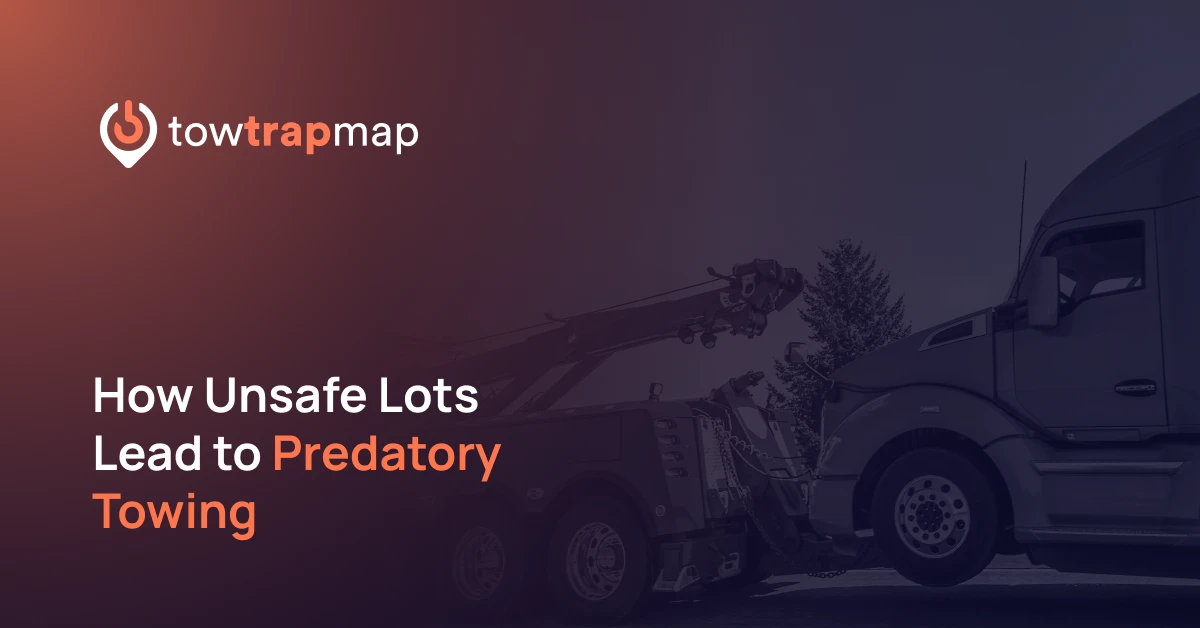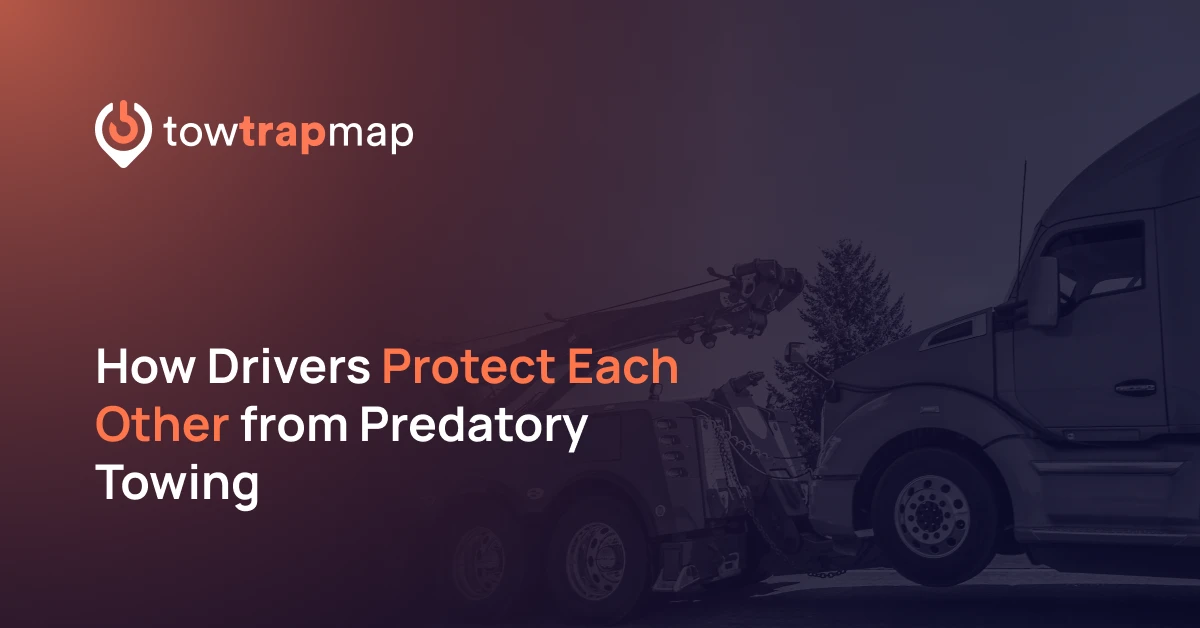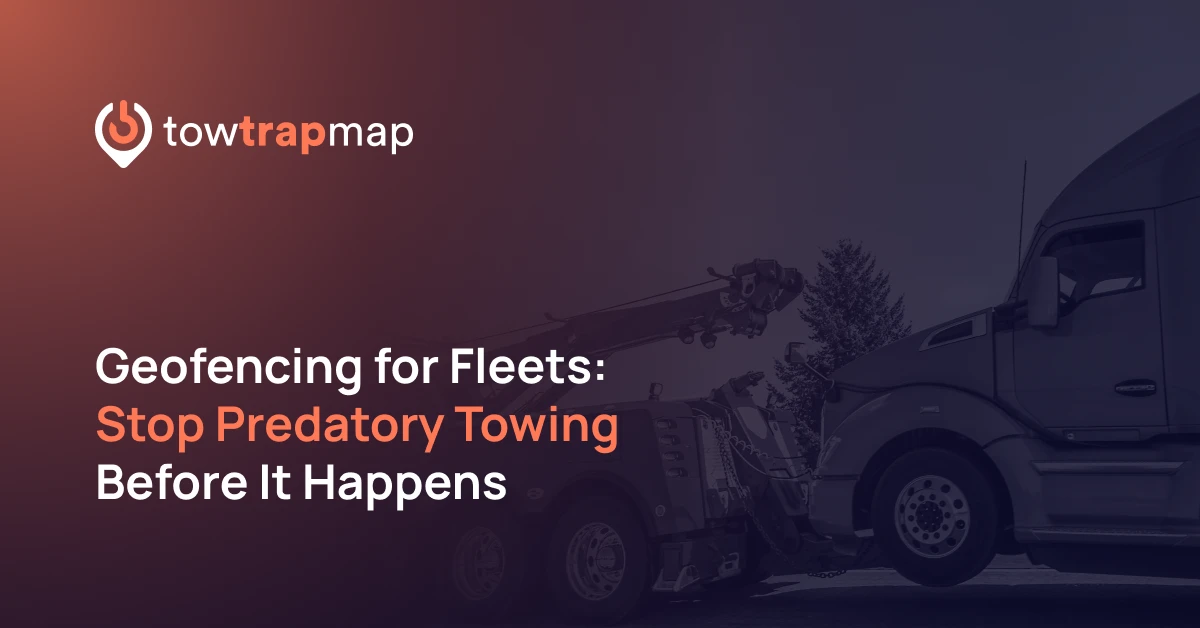Finding safe parking is one of the hardest parts of life on the road. In North America, truck drivers face a severe shortage of legal and reliable parking options. Rest areas fill up fast, truck stops are often overcrowded, and many urban corridors offer little to no safe choices.
This shortage creates fertile ground for a troubling trend: truck parking scams. Drivers looking for rest pull into what seems like a safe lot—only to find themselves trapped by hidden signs, aggressive patrols, or inflated towing fees. These scams don’t just hit drivers with unfair bills; they disrupt entire fleet operations and drain profitability.
Why Parking Shortages Fuel Predatory Towing
The scarcity of truck parking means drivers must take risks. After a 10–12 hour shift, scanning for fine print on signs isn’t always realistic. Predatory towing companies know this. They exploit desperation by targeting high-traffic corridors, ports, and warehouse districts where drivers have little choice but to gamble on questionable lots.
The result is an environment where stopping for rest can quickly turn into a multi-thousand-dollar tow bill.
How Truck Parking Scams Work
Parking scams come in different forms, but they share a common pattern: mislead the driver, enforce quickly, and profit heavily.
Misleading Paid Parking Lots
Some lots look like legitimate paid parking, but the terms are hidden or unclear. Drivers park assuming they can pay later, only to wake up booted—or worse, towed.
“Authorized Parking Only” Traps
Private property lots often feature vague “Authorized Parking Only” signs. With no clear way to become “authorized,” any truck that parks becomes an instant target.
Constant Patrols and Spotters
In scam-heavy areas, tow trucks or hired “spotters” monitor lots 24/7. Some drivers have reported being hooked within minutes of stepping away from their rigs.
The scam doesn’t stop at the hook. Fees balloon fast: $1,500–$3,000 for the tow, $200–$300 per day in storage, plus “gate fees,” “release fees,” and other questionable charges. It’s not unusual for a single incident to reach $5,000–$10,000.
Real Examples Across North America
Truck parking scams are not isolated incidents—they appear in every major freight hub.
In Houston, Texas, drivers report being towed within minutes of entering warehouse lots with hidden signage. Bills commonly top $3,000.
In Los Angeles, California, the parking shortage near ports fuels repeat towing incidents for fleets, with lawsuits revealing charges over $7,000.
In Toronto, Ontario, drivers face aggressive booting and towing in so-called “paid” lots where terms are unclear. Even after new regulations, $5,000+ charges are still common.
These stories show how scams thrive where drivers are most vulnerable.
The Ripple Effect for Fleets
For individual drivers, a scam tow is a painful financial hit. For fleets, the consequences spread further.
Lost loads mean missed deadlines and penalties. Dispatch teams spend hours reassigning freight and negotiating with tow yards. Insurance premiums rise after multiple claims. Drivers lose morale and may even quit after repeated bad experiences—creating costly turnover for fleets.
A $6,000 tow isn’t just a line item—it can trigger tens of thousands in additional indirect costs.
Protecting Against Parking Scams
There’s no single fix for the parking shortage, but there are ways to reduce exposure.
Drivers should be cautious of lots that seem unusually empty, especially in high-demand areas. If signage is unclear, it’s safer to move on. Asking other drivers or checking online forums can reveal hotspots to avoid.
Fleets can take it a step further by training drivers to recognize risky lots, building internal “do-not-park” lists, and using geofencing tools. Platforms like TowTrapMap allow fleets to import geofences directly into Samsara, Geotab, or Motive, sending alerts before a driver enters a known trap.
Why Reporting Parking Scams Matters
The trucking industry’s best defense is knowledge-sharing. Predatory towing thrives in the shadows—but every report makes the map clearer.
On TowTrapMap:
Drivers or fleets submit reports of unsafe lots.
Submissions are moderated and verified.
Locations are marked as pins and geofences on the community map.
With each report, the database grows stronger—and the next driver is less likely to fall victim.
Conclusion
Truck parking scams are more than just a nuisance—they’re a business model built on exploiting driver fatigue and limited parking options. For drivers, they represent thousands in unexpected costs. For fleets, they threaten schedules, profits, and relationships with customers.
But scams only work when drivers are caught off guard. By reporting experiences, using geofencing alerts, and spreading awareness, the trucking community can push back.
👉 Take two minutes to report a suspicious lot at TowTrapMap.com/report. Every report protects the next driver. 🚛



